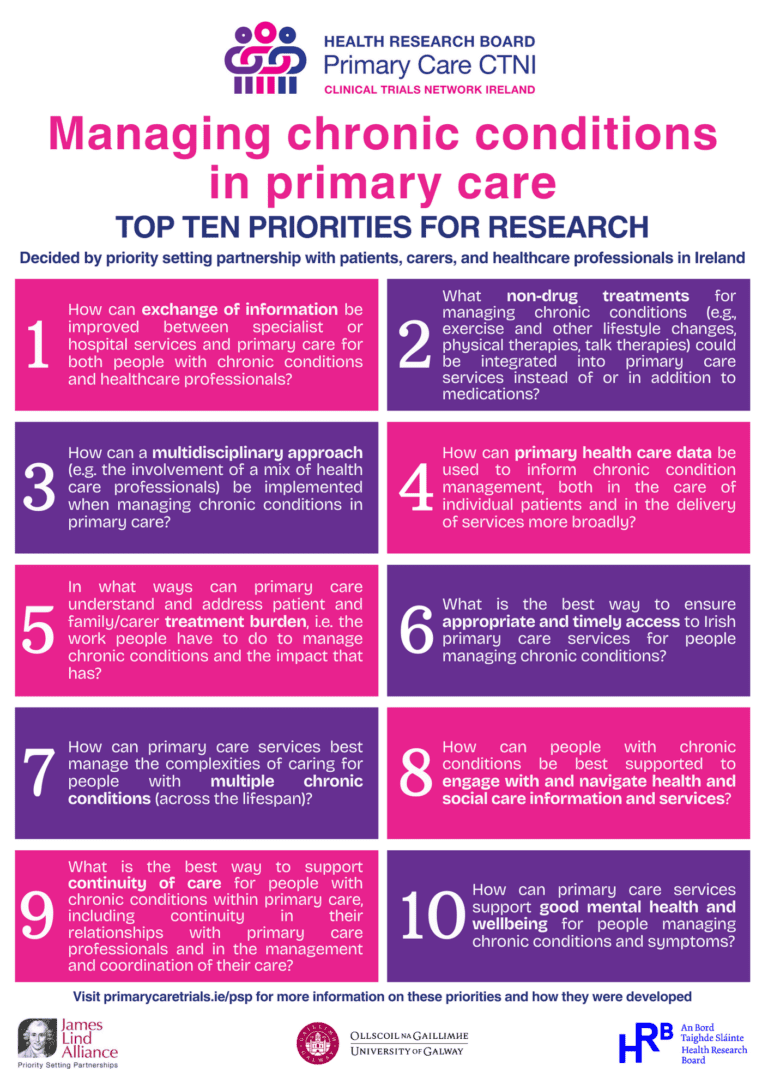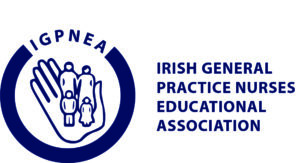What are the most important unanswered questions in primary care research?
Top research priorities for managing chronic conditions, as decided by patients, carers, and healthcare professionals
The HRB Primary Care Clinical Trials Network are delighted to share the top ten research priorities for the management of chronic conditions in primary care.
Submitted, refined, and ranked by the stakeholders most affected, these unanswered questions are those deemed most important to people living in Ireland who are managing their own conditions, caring for people with chronic conditions, or treating chronic conditions in primary care.
The top ten list has been determined with support from the James Lind Alliance, and you can learn more about them and the details of this project below.
Find out more
Find out more about the JLA PSP method by watching the video or clicking on the sections below.
Chronic conditions are incredibly common, and the management of chronic conditions is a major demand on primary care. In Ireland, the total number of people affected by just the top 4 chronic conditions (diabetes, asthma, cardiovascular disease and chronic obstructive pulmonary disease [COPD]) is approximately 1 million. With an aging population, these numbers will likely increase in the coming years, as will the pressure on those affected and the healthcare system.
The priority setting process resulted in a ranked list of 20 priority items. While we will specifically highlight 1-10 as they have been designated as most important, you can access all 20 here: List 1-20
These research priorities are available to others to use in facilitating, designing, and refining research projects. If you wish to discuss the priorities or have an idea for how they could be used, please feel free to get in touch with us. The HRB Primary Care Clinical Trials Network is keen to support the uptake of projects that address these important questions.
Priority Setting Partnerships or PSPs are a prioritisation process developed by the James Lind Alliance, that brings together patients, carers, and healthcare professionals to identify and prioritise the unanswered questions they have about a specific topic.
PSPs are led by a steering group made up of key stakeholders with direct experience of the topic, and they have responsibility for all decision making during the PSP. They decide how best to collect and collate unanswered questions, and then sort and categorise questions into a list ready for ranking.
Final prioritisation happens in a workshop setting, where a Top 10 list of questions is decided on.
This list is then championed by the steering group and promoted to researchers and research funders to encourage them to incorporate these questions into future research.
The James Lind Alliance, named after James Lind, a pioneering Scottish navel surgeon who trialled the use of citrus fruits to combat scurvy in the 1700s, are an organisation funded by the NIHR in the UK. They support the use of the JLA method of PSPs, which aims to address the mismatch between research being carried out and research that patients and healthcare professionals want.
Our partners are relevant organisations and interest groups who are helping us share the PSP with their members and through their communication channels.
We are hugely grateful to these groups for their involvement. If you’d like to find out more about each group, please click on their logo to be brought to their website.
If your group would be interested in partnering with us to share their word about the top ten, please click here to send us a message.







